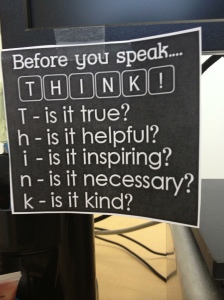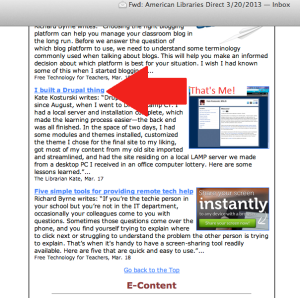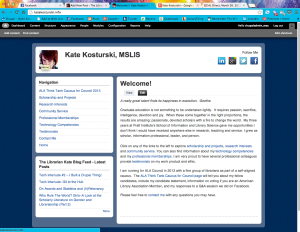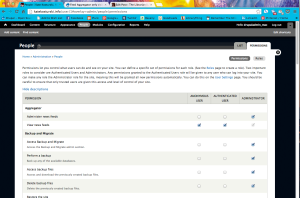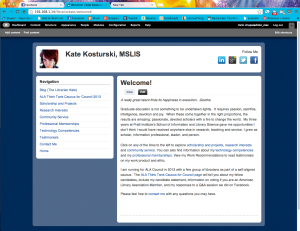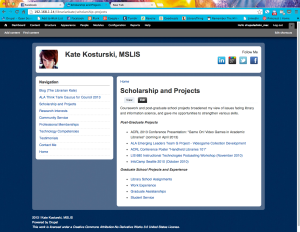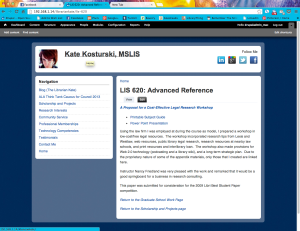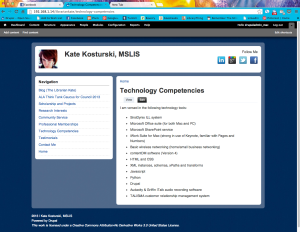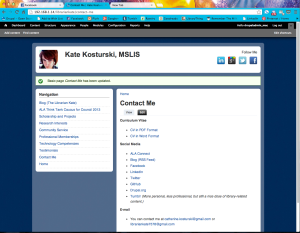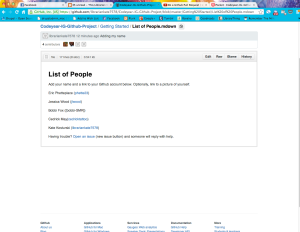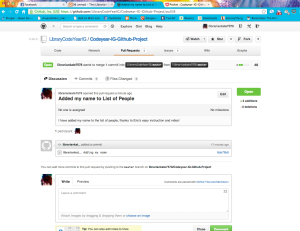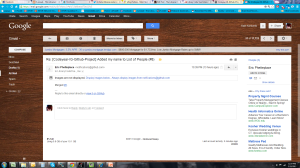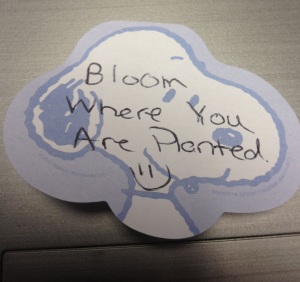Note from the Boss: I am extremely floored, honored, and humbled by the responses received to Part 1. Thank you. This is the kind of conversation we should be having, and continue to have.
In this post, I want to explore gender issues across different types of libraries, focusing first on the academic library. The most vocal posters on gender and libraries often are those in youth services, and they are carrying up a fight that has gone on for over two decades, as Suzanne Hildenbrand noted back in 1989:
Turning from salary to status, the little research that exists tends to confirm the view that within librarianship, children’s librarianship does not enjoy a good reputation or high status. (Hildenbrand 154)
Are these issues faced in other libraries? Time to find out.
The majority of the research I discovered comes from academia, and covers a wide variety of issues – scholarly publishing, collection development, administration and workforce. There was just so much that I could find that I decided to spotlight academic libraries here, and revisit other areas of the field, including our friends in youth services, in another post.
As with Part 1, all sources cited here are available full text through EBSCO (Library Literature and Information Science Full text and Academic Search Premier) and Project Muse. The College and Research Libraries article is freely available online.
Who Rule the University Library? Girls?
The first research on sexism in libraries was done in 1974, two years after Title IX became law. Researcher Anita Schiller found that even in this female-dominant profession, women still faced pay gaps and underrepresentation in high level positions (Schiller 1974, cited in Moran et al. 2009, 216). This wasn’t the last study, and work continued throughout the 1970s and 1980s – both of the field and of ways to effectuate change.
So, nearly forty years later, has much changed? Barbara Moran and her colleagues took a look at this question in 2009, following up on two earlier studies done in 1985 and 1996. Those studies showed that directorship positions were increasing through academia, though slower in research libraries than in liberal arts colleges (Moran 220). Moran and her team, using the same methodology from earlier surveys (a review of the American Library Directory for those in three key positions – director, associate director and department head – for the time period of 1994 to 2004) discovered quite a few things:
- The highest level of administration in academia were still the “old boys club” – the percentage of women directors was still lower than the overall workforce. In spite of this, the number of women in administration continued to increase from the 1985 and 1996 studies.
- Of the 99 Association of Research Libraries (ARL) reviewed, 42 (over 40 percent ) of libraries hired a director of a different gender than their predecessor. 28 positions held by men previously in 1994 were now held by women in 2004.
- The 112 liberal arts colleges in the study saw some slower progress – only 31 of the 112 positions (28%) saw changes in gender with new hires. Of these 31 changes, 20 saw a change from men to women.
- As women in management in all professions increased from 1994 to 2004, so did women managers in academic libraries. (Moran 222-224)
Clearly, there is some good news. The presence of women academic administrators continues to increase, both in the larger ARL libraries and in smaller liberal arts colleges, with the ARL libraries showing the greatest progress. And women in academic libraries are making more progress than other women in academia – there are still less tenured and tenure-track females on faculty, in spite of women holding the majority of the Ph.D’s in the United States. (West and Curtis 2006, cited in Moran 226). We continue to crack the glass ceiling, and perhaps someday we will shatter it completely.
I would like to see a follow-up study incorporating other schools – specialized schools such as medical and law schools, along with community college and schools granting mainly associate’s degrees. It would also be interesting to view these trends outside of the United States. How does progress with academic hiring in Europe or Asia compare to the United States?
But What About the Rest of Us in the Workforce?
A year after Moran’s study, she decided to look at the overall workforce of academic libraries. While her work focused on education levels, retention and age, her review of the 2005 Workforce Issues in Library and Information Science Study (WILIS) uncovered some troubling differences in gender and salary. Full time male academic librarians had a median salary of $57,500, and a mean of $64,000. Female academic librarians showed a median salary of $49,000 with a mean of $53,385 – differences ranging from $8,000 – $9,000 (Moran 217). The differences in median salary are higher than the current differences in pay equity between men and women – while women make $0.77 for every dollar a man makes, female academic librarians are making $0.83- $0.85 for every dollar their male counterparts make. Better, but not perfect.
As with the administrator survey, I would love to see follow up work, if it exists, between different kinds of libraries, as well as differences between countries. The WILIS survey focused on dataset (graduates from University of North Carolina at Chapel Hill) that included librarians from all fields (with the majority being academic librarians).
Women in the Library Collection
Do women find difficulties getting their voice in other aspects of the library, such as the library collection? Hur-Li Lee tracks the development of women’s studies at Rutgers University, from the formation of the women’s studies coursework in the late 1960s to the mid-1990s.
Before the formal women’s studies program at the college started, Douglass College (Rutgers’ college for women) was collecting women’s materials to support a possible future program, as noted at the end of their collection development policy (Lee 341). Unusual because no other college library before sought to collect something that wasn’t directly in support of existing coursework. Sadly, the library did not have much interest from the women’ s studies faculty, because they were focusing on establishing their own reputation to the university (Lee 342). Even as programs were established on the other Rutgers campuses, library collection of women’s studies materials remained at Douglass College, and other libraries throughout the system did not pick up on the need for these materials in their own holdings (Lee 344, 345):
Francis A. Johns, university bibliographer between 1958 and 1979, said, in an interview in 1995, “The stuff [meaning the available resources for women’s studies] was extremely limited [then] and presumably still is [now].
Change came in the late 1970s with the appointment of a new University Librarian, George A. Carroll, who supported a modern women writers’ collection, funded by the Rutgers Foundation. This was unusual as (1) Douglass had been working on this project for most of the decade, (2) the request for the project came from someone not even connected with Douglass, and (3) Carroll went above the normal channels for collection development. It was a broad stroke, but did not last due to other changes in the university structure.
Full change started to take hold in 1982, when the women’s studies programs at Douglass and Livingston merged, new leadership came on board, and the Women’s Studies program became both graduate and undergraduate level two years later (Lee 346). The Douglass librarians also submitted their first proposal to the university for a women’s research center in 1982, but still found resistance from the main library (Alexander Library) as Douglass wanted the collection to be completely house on their campus (Lee 349). By now, no one questioned the importance of women’s studies and their respective research materials – the devil was in the details!
By 1986, Alexander Library had its own women’s studies selector, and by 1988, the university bibliographer George Kanzler co-authored a proposal for the women’s studies library that included the following scenario:
Proposal III has the Douglass Library designated as a full-scale Women’s Studies Library including both a women’s studies resource center and archive collection.
It wasn’t what Kanzler preferred, but inclusion of the proposal was a small victory for Douglass (Lee 352). Two years later, the new Associate University Librarian (who was given responsibility for collection development in reform of the job duties in 1988), wrote a new collection development plan to allow for “the most advanced collections” to be developed at Douglass. (Lee 353). There were still hurt feelings at Alexander and some territorial disputes, but after almost three decades of fighting for the existence of such a collection, acquisition could finally go forward, but it would not be until the end of the decade (and more infighting over location and delivery of materials) before the research center took shape (Lee 355-356).
The establishment of this library is an interesting look at other battles women face in academic librarianship, from a collection development perspective. While acceptance of the idea of women’s studies as a research discipline did not take long (approximately 10 – 15 years), the establishment of the library took twice as long. Douglass’ own commitment and insistence to housing the collection solely on their campus, along with a general perception of Douglass as lower in status compared to Rutgers College and other campuses led to politicking that slowed the process (Lee 357-358). The lesson that other libraries can learn for establishing special collections (not just women’s studies collections) on their campus?
More often than not, politics is an important factor in librarians’ pursuit of excellence, but just as important in librarianship are the foundation of bibliography and the knowledge of user information-seeking behaviors (Lee 358).
It’s not easy to say this, especially after the discussions about the negative connotation of the word, but the one solution that comes to mind is: Play nice with others. However, this doesn’t mean standing down – it can mean to “engage in meaningful conversations to address the issues raised, including the political processes and potential solutions to the inflexible structures” of academic library collection development (Lee 358).In short, be civil. Recognize the system in place and work to change it, but recognize that there may have to be give an take as well. Here is where understanding of the art of negotiation will come in handy. I had some training on negotiation tactics this summer, and it was the best training session I have ever attended – the skills discovered and developed there can only help you in the future.
I highly recommend this study for all interested in collection development (not just women’s studies).
Publish or Perish, Ladies
I’ve covered women in the academic library workforce (as administrators and employees), and women in the collection. What about women in library science scholarly publishing?
As with the library administrator question, does the prevalence of women in the field lead to a prevalence of women in library science bibliometrics? In the social sciences, studies have shown that female authors are underrepresented both in the own works and citations of others. Malin Håkanson reviewed reference and citation data from 1980 to 2000 for three LIS journals: College and Research Libraries, Journal of Academic Librarianship and The Library Quarterly, looking for answers to the following two questions:
- Does gender seem to affect both female and male authors’ choice of references?
- Does gender seem to affect the share of citations received by authors? (Håkanson 313).
This was not the first study of LIS citations by gender, but it is the first to survey both citation use and retrieval over a long period of time. A study of 16 LIS journals by Marianne Ferber from 1987-1989 discovered correlation between subject and gender. Men wrote about document retrieval, international libraries and library history, whereas women wrote about children and youth services, instruction and standards (Håkanson 315). However, this study did not include citation analysis. Later studies by Elisabeth Davenport and Herbert Snyder revealed that female authors are underrepresented in articles by both women and men, but their sample set only covered ten years, perhaps not fully accounting for the time lag of publication and reference to the article. (Håkanson 315)
First, what was discovered about gender and choice of references?
- Of 29,445 references overall, over 17,000 were references to publications by men (59%).
- Of the 10,794 articles authored by women, 53% of the citations came from men.
- Of the 13,946 articles authored by men, 65% of the citations came from men.
- Over time, this distribution converges. In 1980, there was an approximately 60% difference between the two figures. By 2000, this difference has decreased to around 10%. (Håkanson 317-318)
It was trickier to find a correlation between author’s gender and the number of citations. Analyzing the results over time showed increasing and decreasing numbers, but overall the figures remained relatively constant. (Håkanson 318).
So let’s look at the first question. It has confirmed earlier results, and suggests that authors see articles authored by men as more credible towards their research. However, the number of references to articles written by women increases over time, suggesting some form of gender parity in scholarly work (Håkanson 319). However, men still are using far less research by women as women are, thus the gender bias in choice of reference (Håkanson 320).
And what of citation analysis? In spite of figures remaining fairly constant, men received more of the lion’s share of citations than women. Could this be due to presence of scientific quality, importance, relevance, or impact? (Håkanson 320). But, as more articles by women became part of the scholarly landscape, their citation in other works tends to increase. This was not the case here:
The importance of gender does not seem to disappear even when the share of female authors becomes as large as or larger than the share of male authors….Instead, the indication of gender bias has become more subtle and complex. (Håkanson 321).
A study such as this confirms the importance of blind and double blind peer review. I’m an editor for Reference and User Services Quarterly, and I am grateful that identifying information from articles (with one or two exceptions) is stripped out. It allows me to edit the articles with an eye to content, not the sex of the author. I would be interested in going back to the articles I have reviewed to see any connection between gender and my comments.
Conclusions
The academic library is the petri dish for change. We see increases in administration, collections and publications, but subtle gender biases are still there. Sometimes, as in the case of Douglass College, women can be their own worst enemies, fighting for their cause without an eye to larger processes that could need their own reform first. Pay gaps still exist, though happily they are not as large as the average. Much has been done in the forty years since Title IX. What will happen in the next 40 years?
What’s Next?
Part 3 will focus on the youth services librarians. I feel a need to learn more about what they face in gender issues. Thus, I invite any of the youth services librarians who read this blog (and I think there are more after publication of Part 1) to email me at librariankate7578 at gmail dot com with your own stories of gender bias, both within and outside the youth services realm. All information will be kept confidential and names will be changed.
Sources
Håkanson, M. (July 2005). The impact of gender on citations: An analysis of college & research libraries, journal of academic librarianship, and library quarterly. College and Research Libraries, 66(4), 312-327.
Hildenbrand, S. (September 1, 1989). Women’s work within librarianship: Time to expand the feminist agenda. Library Journal, 114, 153-55.
Lee, H. (Fall 2002). Activism in library development: Women’s studies at rutgers university, 1970-1995. Libraries & Culture, 37(4), 339-362.
Moran, B. B., Leonard, E., & Zellers, J. (Fall 2009). Women administrators in academic libraries: Three decades of change. Library Trends, 58(2), 215-228.
Moran, B. B., Marshall, J. G., & Rathburn-Grubb, S. (Summer/Fall 2010). The academic library workforce: Past, present and future. Library Trends, 59(1-2), 208-217.

